Electricity refund? Not in California -- California utility regulators want to screw you, boost company profits.
San Diego Reader (2014-05-07) Don Bauder This Page: https://copswiki.org/Common/M1432Media Link: http://www.sandiegoreader.com/news/2014/may/07/citylights1-electricity-refund-not-california/%20type%3d%22html%22
More Info: Coalition To Decommission San Onofre, Shut San Onofre, Stop The Unfair Settlement
“California historically has offered one of the most constructive regulatory environments in the nation,” says Hugh Wynne, a Wall Street research analyst. Because the California Public Utilities Commission strives mightily to boost utility profits, the state’s large electric utilities can expect the value of their properties to rise by 8 percent annually, while power companies in other states have to get along on 5 percent growth, says Wynne.
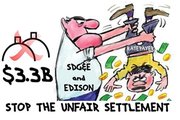 Citizens’ Oversight Projects (from whose website this cartoon comes) is among the groups fighting the utilities settlement.
Citizens’ Oversight Projects (from whose website this cartoon comes) is among the groups fighting the utilities settlement.
The commission claims its mission is to provide consumers with safe, reliable service at reasonable rates. So why is it obsessed with screwing consumers by fattening utilities’ profits?
The reason is that the commission is a Machiavellian, byzantine institution in which “no” often means “yes” and “yes” means “no,” and shadowy figures communicate with winks and nods or unintelligible utterances. It’s Murder in the Cathedral epitomized.
Consider intervenor fees. These are paid to individuals or groups that participate in commission proceedings — say, a rate case in which a utility requests fat profits. To get intervenor fees, you must make a substantial contribution to the hearing. The commission decides which contributions are substantial. Generous payments generally go to intervenors who play ball with the commission — are deferential, nonaggressive, pliant.
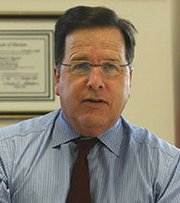 Image by Joe Klein
Mike Aguirre
Image by Joe Klein
Mike Aguirre
San Diego attorney Michael Aguirre fought fiercely to keep San Diego Gas & Electric from forcing consumers to pay uninsured costs from the 2007 fires, which were greatly caused by the company. Aguirre won but was denied intervenor compensation. Recently, the California Environmental Justice Alliance, which also holds strong views, was turned down for such payments.
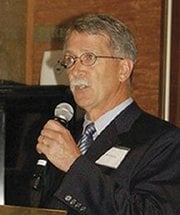 Bill Powers
Bill Powers
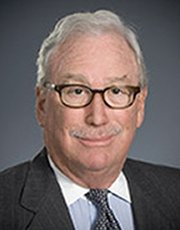 Michael Peevey
Michael Peevey
Bill Powers of San Diego’s Powers Engineering says that under the current commission head, Michael Peevey (a former president of Southern California Edison), intervenor compensation is “a blatant club. If you tell it like it is in a controversial proceeding, you are highly likely to get very little compensation, or none.”
A classic example of this manipulation may be going on right now. The San Onofre Nuclear Generating Station, owned 78.2 percent by Edison and 20 percent by San Diego Gas & Electric, was permanently shut down last year after water leaked from steam generator tubes. In effect, Edison replaced defective tubes with more defective tubes. It blames the manufacturer, and that battle will probably go on for a long time.
The question then became, who pays for all this? Consumers or shareholders? Edison wanted ratepayers to ante up heavily for the bad tubes, as well as the plant itself. Hardly surprisingly, consumer groups screamed. Shareholders, not ratepayers, should take the hit when management screws up.
On March 27 of this year, the Office of Ratepayer Advocates, a body within the commission; a consumer advocacy group called the Utility Reform Network; Edison; and SDG&E suddenly announced they had reached a compromise on the question of who pays the closure costs. The proposal would have to be approved by the full commission at a later date.
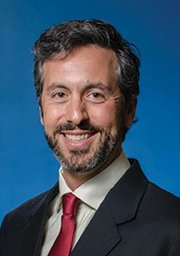 Matt Freedman
Matt Freedman
San Francisco–based Utility Reform Network sent out a news release blaring “$1.4 Billion in Refunds Is a Good Deal for Customers!” This so-called consumer “refund” would be a “huge win” for consumers and “hold utility shareholders accountable for the fiasco,” exulted Matthew Freedman, a lawyer for the network. Edison and SDG&E sent out releases that said consumers would get a good deal.
The Los Angeles Times repeated Utility Reform Network’s claim that consumers would get a nifty refund. So did television and radio stations. U-T San Diego said ratepayers would save money.
But Aguirre read the document carefully and saw that consumers would have to ante up almost $3.3 billion for items such as the base plant, operations and maintenance, nuclear fuel, and replacement costs. So there was no refund at all — just more costs piled on ratepayers. (For years, San Diego Gas & Electric consistently had the highest electric rates in the nation; recently Edison has gone to the top of the quarterly list compiled by the Jacksonville Electric Authority. What happened to SDG&E? After getting negative press for its extremely high rates, “They pulled out of the survey. They are no longer participating,” says Geri Boyce, spokesperson for Jacksonville. Hmmm...)
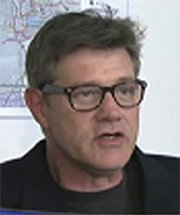 Charles Langley
Charles Langley
Aguirre contacted Freedman, and Utility Reform Network rewrote its online press release to take out the word “refunds” but did not redistribute the correction to the media, he says. Indeed, it continued to tout “refunds” on Twitter. Aguirre had Charles Langley, an assistant, contact media. The U-T finally mentioned the $3.3 billion. The Orange County Register got it right. Television and radio outlets KUSI, KPBS, KOGO, ABC Channel 10, and XETV got the story right. The Los Angeles Times refused to put the $3.3 billion in a new story.
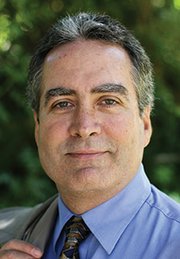 Ray Lutz
Ray Lutz
San Diegan Ray Lutz of the Coalition to Decommission San Onofre initially thought the so-called compromise was a good one, but as he studied it, he says he “had to go the other way.” The coalition, like Aguirre, has filed objections to the deal with the full commission. The compromise is “forcing the ratepayer to underwrite the mistakes of Edison.”
Aguirre complains that the compromise was reached before there was any comprehensive study of how much blame belongs with Edison management. He also notes that Freedman held an ex parte meeting with Peevey at Peevey’s request. Freedman urged the commission to adopt the settlement. Hmmm, again.
Mark Pocta of the Office of Ratepayer Advocates defends the proposed deal. “The settlement results in approximately $2.571 billion cost to ratepayers, compared to $3.7 billion requested by [Edison],” he says. Capital investment not related to steam generators “will be amortized at a very low rate over ten years beginning February 1, 2012.” That “will serve to dampen the rate impacts on customers.” The matter of Edison’s blame “would take years to litigate.”
Pocta prefers not to talk about whether the utilities commission uses intervenor fees to control the agenda.
Freedman of Utility Reform Network says the settlement “results in a significant savings relative to what the utilities proposed.” He says, “[Our Network] was unable to find any example of the [utilities commission] ever forcing shareholders to pay for the entire costs of a plant that was placed into rates and then prematurely retired.”
He disputes that intervenor compensation is involved in the settlement and says any such accusation “is untrue.”
But Aguirre predicts that Utility Reform Network will get a juicy intervenor fee because it is playing footsie with the commission. Lutz agrees.
Media Form edit
| Title | Electricity refund? Not in California -- California utility regulators want to screw you, boost company profits. |
| Publisher | San Diego Reader |
| Author | Don Bauder |
| Pub Date | 2014-05-07 |
| Media Link | http://www.sandiegoreader.com/news/2014/may/07/citylights1-electricity-refund-not-california/ |
| Embed HTML | |
| Forum Link | |
| Note | Mentions Michael Aguirre |
| Keywords | Coalition To Decommission San Onofre, Shut San Onofre, Stop The Unfair Settlement |
| Media Type | Linked Article |
| Media Group | News |
| Curator Rating | Plain |
| Book ISBN | |
| Author Name Sortable | |
| Thumbnail Link |
 Copyright © by the contributing authors. All material on this collaboration platform is the property of the contributing authors.
Copyright © by the contributing authors. All material on this collaboration platform is the property of the contributing authors. Ideas, requests, problems regarding Cops? Send feedback

